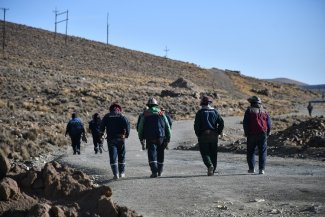More than half a million Indian workers are expected to march on New Delhi this Thursday in an “unprecedented” show of Indian working-class solidarity.
Workers from across the country will rally outside the capital’s parliament to protest against the “anti-people policies” of the United Progressive Alliance (UPA) government.
There will also be a series of rallies and protests in cities and towns across the country.
While united trade union action is now quite common in urban centres such as New Delhi, in other states across India such a show of unity is unparalleled.
Though the UPA government is credited with the passing a number of landmark measures aimed at improving the lives of the more than 800 million Indians who live on less than US$2 a day – for example the Food Security Act, which is routinely cited as the largest anti-hunger scheme in the world; the banning of the employment of people for manual scavenging and the cleaning of septic tanks and sewers; and the Street Vendors Bill which recognises the rights of 10 million of India’s most marginalised workers – critics describe these initiatives as ‘gimmicks’ which are more to do with winning the forthcoming general elections in May 2014 rather than fundamentally ending poverty in India.
“The soaring cost of living, increasing joblessness, the opening up of all sectors to foreign-direct investment and disinvestment in the public sector has pushed the country to a state of economic crisis,” says DL Sachdeva, National Secretary of All-India Trade Union Congress (AITUC).
“In this context, this is an outburst of the working class against the indifference and injustice they face. Now it is the government’s turn to face more intensified and united struggles throughout the country.”
Rare show of unity
Representatives of 11 central trade union organisations (CTUOs) along with various national federations representing the banking, insurance, power and mining sectors will join independent unions and workers from the informal sector in this rare show of unity.
They will submit a memorandum to Prime Minister Manmohan Singh on the 10-point charter of demands which they delivered earlier this May.
Amongst other points it called for an increased minimum wage and universal social security for all workers.
“All ruling parties, be it the Left, the BJP [Bharatiya Janata Party] or the [Indian National] Congress, very conveniently tend to ignore workers’ issues and that is why all CTUOs have come together,” R Chandrasekharan, National Vice President, Indian National Trade Union Congress (INTUC) told Equal Times.
“When more than half a million people stand united, I think the government will be forced to heed the working-class issues.”
The trade union coordination committee’s 10-point charter of demands included raising the minimum wage to 10,000 rupees (US$163 approximately) per month, universal social security and pension cover for all workers, and equal pay (and benefits) for contract workers doing equal work.
The charter also called for stricter implementation of labour laws, concrete measures to contain the rising in living costs and to ensure job creation, an end to disinvestment in the public sector, compulsory registration of trade unions within a period of 45 days and the immediate ratification of ILO Conventions 87 (on freedom of association and the right to organise) and 98 (on the right to organise and collective bargaining).
“On 28 February 2012, the coordination committee of trade unions organised a nationwide hartal [strike action]. In 2013, between 20 and 21 February, we observed a 48-hour total strike in the country, which forced the prime minister to form a Group of Ministers committee (GoM),” says Saji Narayanan, National President of Bharatiya Mazdoor Sangh (BMS, or the Indian Workers’ Union in English).
On 23 May 2013, the CTUOs sent a joint letter to Prime Minister Singh urging him to start a dialogue on their list of demands within a month.
"In spite of this, nothing happened," says Tapan Sen, General Secretary of the Centre of Indian Trade Unions (CITU).
For the trade unions, Thursday’s action is only the beginning.
“The government keeps making futile promises. Taxing the poor and subsidising the rich is the policy of the government. We shall continue with our struggle until we achieve results," says Narayanan.
“Forced to listen”
The banking sector, which accounts for around 75 per cent of India’s domestic credit, will march under the United Forum of Bank Unions banner.
"The government with its move towards disinvestment of shares in favour of the private sector, will be forced to listen to us, and if they don’t, we will force them to change," says CH Venkatachalam, General Secretary of All-India Bank Employees Association.
The National Secretary of Self-Employed Women’s Association (SEWA), Manali Shah told Equal Times says this march represents all Indian workers.
“Unity is what is reflected through this march. The charter of demands was prepared unanimously, and as agreed upon, collective actions will be taken up in district headquarters across states.
“The demands raised are beneficial for the entire working class, especially for those who are members of our union.”
With the winter session of parliament in progress and general elections scheduled for May 2014, India’s politicians are keen to win the trust – and votes – of the people.
The recent legislative assembly elections saw the success of the Aam Admi, or Common Man, Party in the Delhi state assembly.
That a party of just one year managed to win 23 out of Delhi’s 70 seats, ending 15 years of Congress rule, sent shockwaves through India’s old political hierarchies and patriarchies.
India’s masses have a key role to play in the forthcoming elections and with this in mind, the trade union are keen to make sure their voices are heard – on Thursday and beyond.









